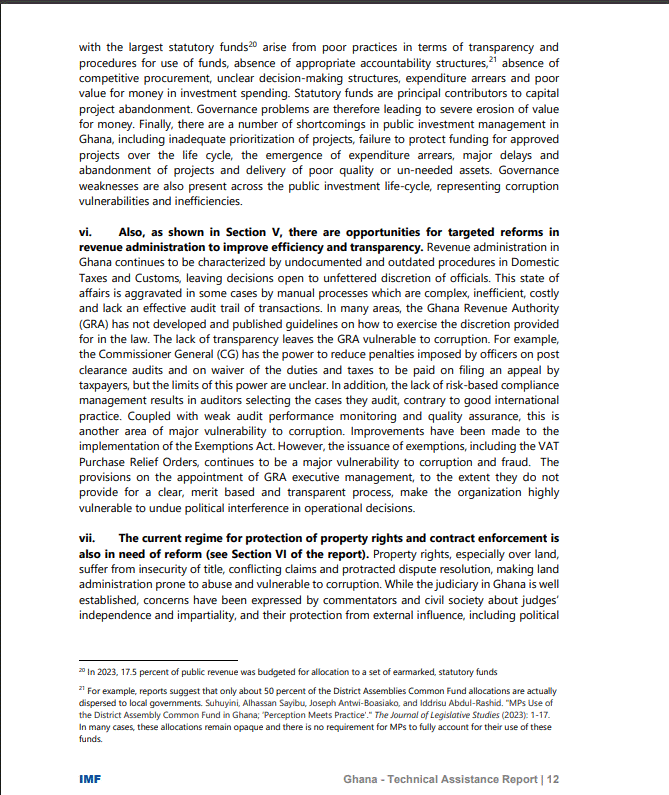Read also:
- Volta Regional Football Association introduces competition management system
- From gas to groceries, has Trump kept his promise to tackle rising prices?
- Narco-sub carrying 1.7 tonnes of cocaine seized in Atlantic
- Afghan opium crop plummets after Taliban ban – UN report
- Awutu Senya East shooting: Interior Minister’s findings have vindicated me – Hawa Koomson
The IMF noted that a number of anti-corruption agencies have been established over the last decades, including, most recently, the Office of the Special Prosecutor (OSP).
“The introduction of the OSP in 2018, alongside other governance reforms, has renewed energy for Ghana’s anti-corruption efforts and, despite challenges, demonstrates the authorities’ resolve to challenge the norm. Yet the anticorruption framework is hampered by fragmentation, overlaps in functions, insufficient independence, and lack of resources,” the Technical Assistance Report, titled “Governance Diagnostic Assessment March 2024”, prepared by the IMF, pointed out.
The report, which was released by the Finance Ministry on Monday, November 3, 2025, further stated that it is imperative to address those issues and to empower the agencies with the legal tools to effectively deliver on their mandates, including through deeper reforms and firmer implementation of the legal framework on asset declaration, conflicts of interest, access to information, and audits.
“Greater transparency would increase public trust and minimise the perception that decisions reached by the anticorruption agencies (for example, not to prosecute) are motivated by political considerations.
“It is particularly important to insulate the accountability institutions from political control and influence by strengthening the legal provisions on appointment and removal of key officials, among other measures,” it said.


In other matters, the report pointed out that revenue administration in Ghana continues to be characterised by undocumented and outdated procedures in Domestic Taxes and Customs, leaving decisions open to the unfettered discretion of officials.
According to the report, which was released by the Finance Ministry on Monday, November 3, 2025, this state of affairs is aggravated in some cases by manual processes which are complex, inefficient, costly and lack an effective audit trail of transactions.
In many areas, the report said, the Ghana Revenue Authority (GRA) has not developed and published guidelines on how to exercise the discretion provided for in the law.
The lack of transparency leaves the GRA vulnerable to corruption, it said.
For example, the report stated, the Commissioner General (CG) has the power to reduce penalties imposed by officers on post-clearance audits and on waiver of the duties and taxes to be paid on filing an appeal by taxpayers, but the limits of this power are unclear. In addition, the lack of risk-based compliance management results in auditors selecting the cases they audit, contrary to good international practice.
“Coupled with weak audit performance monitoring and quality assurance, this is another area of major vulnerability to corruption. Improvements have been made to the implementation of the Exemptions Act. However, the issuance of exemptions, including the VAT Purchase Relief Orders, continues to be a major vulnerability to corruption and fraud.
“The provisions on the appointment of GRA executive management, to the extent they do not provide for a clear, merit based and transparent process, make the organization highly vulnerable to undue political interference in operational decisions,” it said.

In response to a request from the authorities of Ghana dated February 17, 2023, an IMF interdepartmental (LEG/FAD/MCM) Governance Diagnostic (GD) mission team visited Accra, Ghana from October 16 – 27, 2023 to conduct an assessment of governance weaknesses and corruption vulnerabilities. The purpose of the mission included helping the authorities design an action plan with specific prioritized, sequenced recommendations and structural reform to enhance ransparency and accountability, prevent and combat corruption, in line with the IMF’s 2018 Framework for Enhanced Fund Engagement on Governance.2 The in-person mission was preceded by a virtual scoping mission conducted between September 18 – 29, 2023.
The mission was led by Mr. Gomiluk Otokwala, and the team also comprised Mr. Ron Snipeliski, Ms. Rebecca Obare, Ms. Bonolo Namethe (all LEG); Mr. Thabo Letjama, Mr. Ed Hearne (both FAD), and Mr. Ravi Mohan Periyakavil Ramakrishnan (MCM expert). Mr. David Robinson provided support remotely and contributed to the drafting of this report. The mission was also supported by Ms. Rachel Sigman, a short-term expert with knowledge and understanding of the context, political economy, and major governance weaknesses in Ghana.
The mission team met with the Chief Justice of Ghana, some Supreme Court Justices, the Attorney General and Minister for Justice, Deputy Minister of Finance in charge of revenue, and the Governor and Deputy Governors of the Bank of Ghana (BoG). The mission also met with heads and senior staff of key ministries and agencies including the Ministry of Finance, the BoG, the Office of the Special Prosecutor (OSP), the Ministry of Justice (MoJ), Ghana Revenue Authority (GRA), Public Procurement Authority (PPA), Financial Intelligence Centre (FIC), Securities and Exchange Commission (SEC), National Insurance Commission (NIC), Ghana Investment Promotion Center (GIPC), Ministry of Roads and Highways (MRH), Ministry of Education (MoE), secretariats of four statutory funds, Right to Information Commission (RTIC), Commission on Human Rights and Administrative Justice (CHRAJ), and Ghana Police Service. In addition, the mission met with senior officials and representatives of the private sector, professional bodies,5 academia,6 civil society7 and international development partners.
The mission wishes to express its sincere appreciation for the excellent support and cooperation given by officials and staff of these various agencies, in particular the main point of contact for the Government of Ghana, Ms. Eva Mends (the Chief Director in the Ministry of Finance), and her staff. The mission is also grateful to civil society organizations and staff of international partners for their cooperation, as well as the candid and constructive discussions. The mission appreciates the support provided by Mr. Stephane Roudet (IMF Mission Chief for Ghana), Mr. Arthur Sode and the entire Ghana team, Mr. Leandro Medina (IMF Resident Representative for Ghana), Mr. Osa Ahinakwah (Local Economist) and Ms. Alyss Ben-Smith. The mission is thankful for the administrative assistance provided by Ms. Alexandra Rajs and for the overall guidance and advice provided by Mr. Emmanuel Mathias, Mr. Joel Turkewitz and Ms. Tina Burjaliani.
This report reflects information gathered before and during the mission in October 2023 and in post-mission exchanges with the authorities in 2024. At the time of the finalization of the report, a new government has taken office in Ghana following the elections in December 2024. To maintain the integrity of the report, its content does not reflect any changes introduced by the new authorities (unless stated specifically).
In his inaugural address, the incoming President pledged to pursue a four-point agenda focused among others on “governance and constitutional reforms” and “accountability and the fight against corruption”. The new administration’s manifesto includes plans for many important governance and anti-corruption reforms, including in areas relevant to the findings in this report. The platform includes plans to scale up revenue mobilization by taking measures such as restructuring the GRA, reviewing the PFM Act and the Public Procurement Act to “plug leakages” and reduce corruption. The platform also includes plans for investigating, prosecuting and recovering proceeds of corruption; implementing “measures to curtail abuse of singlesourced and restricted tendering procurement”; enforcing the assets declaration regime; supporting the Auditor-General to enforce surcharges in order to retrieve embezzled funds; enacting a conflict-of-interest law for all government officials; strengthening the procurement legal framework to ensure greater transparency and to “prevent conflicts of interest and insider dealing by politically exposed persons in the award of contracts” (see Resetting Ghana: Jobs. Accountability, Prosperity—NDC 2024 Manifesto).




